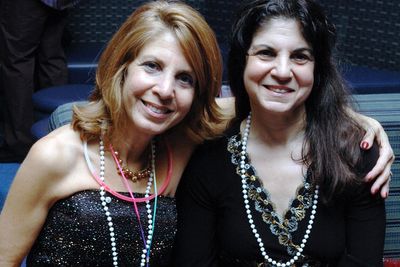I tap on the window glass of the art therapy room to get my sister's attention. Her big brown eyes, magnified by drugstore reading glasses, look up. She sees me but doesn't react, goes back to painting a naïve scene of the East River. So I wait for her, as I have for decades.
My sister embodies the grit of a bullfighter. She has a big heart for small dogs and a guttural laugh that defies her petite frame. And she has a serious and debilitating mental illness, which led her — again — to a New York hospital after a distressing incident at her neighborhood senior center. The hospital's acute care psychiatric unit did not have a bed available at the time. But, fortunately, a positive UTI result allowed her to be admitted — the kind of twist, both serendipitous and tragic, that has followed my sister since childhood.
Her traumatic journey began when she was nine years old and contracted a rare case of measles encephalitis. It was 1960, three years before a vaccine could have made her disease preventable. One out of 1,000 children who got measles back then suffered a lifelong disability. My sister was one of them. She suffers permanent brain injury and lives with complicated mental health psychoses.
This insidious disease has been a struggle for my sister her entire life. She rejects treatment, counseling, family assistance and government aid. She refused a disability pension because of its very name. In her mind, she is not disabled. She suffers from anosognosia, a profound lack of judgment and awareness of her own mental health condition. These symptoms thwart my sister's ability to be her own best advocate, so she makes decisions that have led her down dark roads replete with bizarre turns and inscrutable characters.
Weeks earlier, when I was first called to the hospital, I could barely recognize my sister — a hunched-over, squalid figure in distress near the nurses' station. As I drew closer, I heard her obsessing about her "stolen" shopping cart, which she relies on to steady her walk. She was adamant about retrieving her property, a bulging load of foul-smelling artifacts, tokens of her precious world. I tried, unsuccessfully, to calm her.
Since then I've been attending weekly family meetings, which include my husband, a psychiatrist and a social worker. These are stressful encounters and as unpredictable as my sister's emotions. She keeps telling us she wants to be discharged to her unsafe apartment, where she lives in filth from infestation, heavy hoarding and an unbearable stench because she's afraid to open the windows.
My sister vehemently resists the idea of assisted living. She's also fearful of emergency shelters. Kate, our team social worker, likes my sister and tries to earn her trust. But Kate echoes my concerns about safety and the loop that traps many mentally ill patients — discharge to the shelter system, noncompliance, relapse, another hospitalization.
In 2003, the New Freedom Commission on Mental Health for the severely mentally ill made recommendations for improving care, which have not advanced beyond baby steps. Court-ordered outpatient treatment programs vary by state and region. My sister's challenge is compounded by a lack of community housing that would facilitate an outpatient program. Studies suggest that effective outpatient programs are linked to people who receive supportive housing services.
Like many family members of the mentally ill, I have lost time, income, patience, sleep and my own good health in search of a sustainable model for living with mental illness. Most affordable health coverage limits inpatient psychiatric services. Medicare, for example, pays only 190 days in one's lifetime for inpatient psychiatric treatment. HIPAA privacy rules also hamper the way mental health information can be shared with caregivers when a patient is noncompliant.
These roadblocks led me to advocate for my sister before the Measles and Rubella Initiative in Washington, D.C., the World Health Organization in Geneva, Switzerland, and, ultimately, the New York State Supreme Court to become my sister's legal guardian.
When the art therapy door finally opens, my sister emerges. I see a positive transformation from weeks before. She's pushing a rollator walker with an oil-stained grocery bag, a crumpled notebook and some loose papers on its seat. She shows me her artwork. We settle into a comfortable corner and share a snack.
But soon she becomes agitated about her apartment. I remind her that she doesn't have the resources to cover the expenses. She says she will get a job. I submit to her argument, commendable and heartbreaking at once. She is easy to redirect, and we talk about the activities at the hospital — karaoke, music, writing, group council and fall prevention. I am amazed at how much brighter she appears after six weeks.
She tells me she wishes she could remember the title of her favorite song for karaoke. I remind her that it's "I Hope You Dance." We walk to the standing computer station and find Lee Ann Womack's version on YouTube. As we listen in low volume, I pause the mouse while she jots down the lyrics.
I ask if she wants to listen to a favorite song of mine and she obliges. With our shoulders touching, we watch and listen to a poignant refrain. Suddenly, my eyes well up and the emotional floodgate bursts open. We are standing in the middle of the psych floor and I am sobbing, completely embarrassed. And I don't have a tissue. My sister looks me square in the eye with compassion and says, "It's OK."
And for a finite moment, it is.
The myriad challenges I face with my sister have strengthened me as a wife, a mother and a grandmother. With the kind support of friends and professionals, my sister is safe now, and I continue to share good moments with her. We were seeking another mental health evaluation when stay-at-home orders due to the novel coronavirus were mandated. Unexpectedly, the pandemic has quieted her psychoses.


